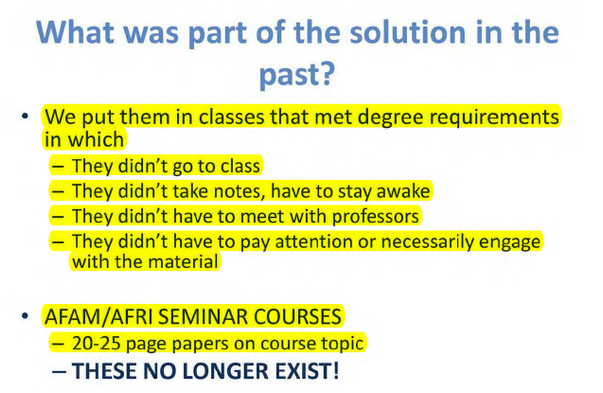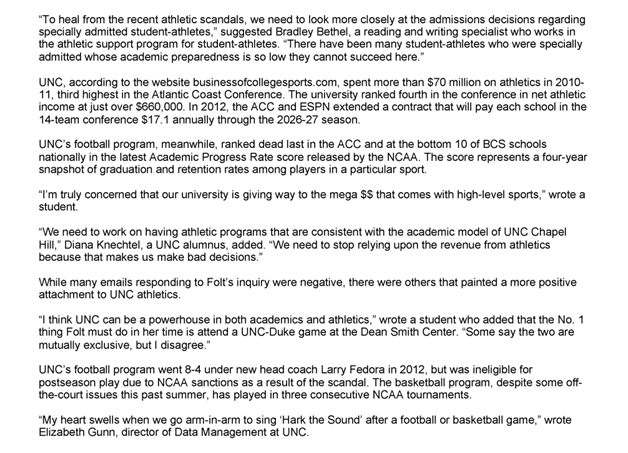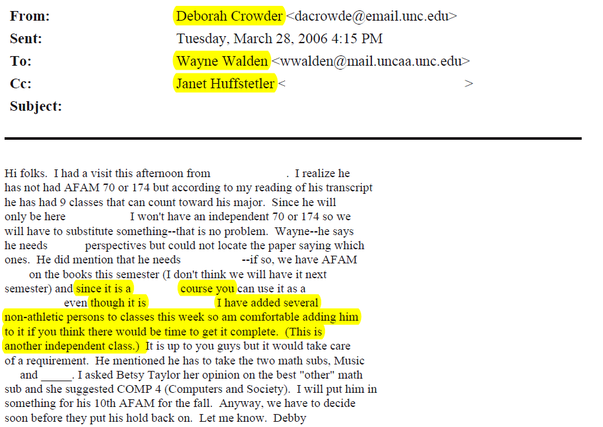Ticket, here is an article from last summer that may help you understand what exactly the charges are. The allegations revolve around lack of institutional control and impermissible benefits as others have tried to point out to you.
Examining UNC's Notice of Allegations
Chris Moore - Jun 4, 2015
The NCAA has accused the University of North Carolina of committing five major violations, including lack of institutional control.
The NCAA sent a Notice of Allegations to UNC on May 20 outlining the charges, which stemmed from a second investigation into the athletic department. The university released the document on Thursday.
The lack of institutional control charge is the headliner of the five allegations. Essentially, this allegation means that the officials in charge of regulating the UNC athletic department failed at their jobs.
This charge was brought because the NCAA deemed that UNC had an “unchecked” system of providing improper academic assistance to its athletes.
This charge typically carries the harshest sanctions the NCAA can levy. Previous schools hit with lack of institutional control, such as USC and Boise State, have been given probation, scholarship reductions and postseason bans. This allegation is not sport-specific, but instead is an indictment on the behavior of the athletic department on the whole. Because of this, sanctions could extend to every athletic program or individual programs that committed the most severe violations.
After the lack of institutional control, the next-most serious charge is that the university provided impermissible benefits to athletes from 2002-11. This allegation is in relation to the academic support staff and irregular classes in the African and Afro-American Studies department.
The NCAA alleges that UNC provided illegal extra benefits because the staff made arrangements for athletes that weren’t available for regular students. The alleged improper conduct includes requesting course offerings for student-athletes, suggesting assignments for athletes, turning in assignments for athletes and recommending grades for athletes.
The Notice of Allegations states explicitly that those special arrangements were made to “help ensure the eligibility of academically at-risk student-athletes.” Though the classes were available to all students, the NCAA says that the amount of involvement by athletic academic counselors “relieved student-athletes of the academic responsibilities of a general student.”
Under the cloud of the impermissible benefit charge, the NCAA said that 10 athletes from 2006-11 took more credits in independent study classes than the university permits its students to take. Those 10 athletes were able to exceed the maximum because the university was operating independent study classes under the disguise of lecture classes. The NCAA says it was an extra and impermissible benefit to allow athletes to exceed the maximum because regular students could not enroll in that many independent study hours.
Similar to this charge but more specific in scope, the third allegation was that
Jan Boxill knowingly provided extra benefits in the form of impermissible academic assistance to women’s basketball players. Boxill was the director of UNC’s Parr Center for Ethics and was also an athletic academic counselor for the women’s basketball team. The bulk of these impermissible academic benefits include Boxill adding content to women’s basketball players’ papers and assignments.
The last two allegations are that Deborah Crowder and Julius Nyang’oro violated NCAA principles by refusing to participate in the NCAA’s investigation. The NCAA considers these major violations. These two allegations were factors in charging the university with lack of institutional control.
There are no specific charges against
Roy Williams, Sylvia Hatchell,
Larry Fedora or any other athletic coach.
The allegations are against the athletic department as a whole and the athletic academic support office. The three individuals specifically charged — Boxill, Crowder and Nyang’oro — are no longer employed by the university.
The Notice of Allegations makes it clear that the NCAA believes UNC exploited its irregular courses for the purpose of maintaining eligibility. It also cites all three major sports as beneficiaries of the system.
“
The AFRI/AFAM department created anomalous courses that went unchecked for 18 years,” the report says. “
This allowed individuals within ASPSA to use the courses through special arrangements to maintain the eligibility of academically at-risk student athletes, particularly in the sports of football, men’s basketball and women’s basketball.”
Potential Penalties
Given the context of the allegations, there’s really no way to predict what penalties or sanctions will stem from this report.
The two charges of lack of institutional control and providing impermissible benefits open the door for just about any penalty.
With lack of institutional control, the entire athletic department should be put on probation, at a minimum. The significance of probation is that should UNC commit another major violation during that probationary period, the death penalty becomes a possibility. Additionally,
the charge could bring postseason bans and scholarship reductions, varying in severity by sport.
The NCAA’s framing of the case as a machine for providing impermissible benefits is an interesting angle.
The Committee of Infractions doesn’t really have the jurisdiction to determine that classes were too easy. None of the allegations relate to academic fraud. But because athletes were given preferential treatment in enrolling in the classes and receiving improper aid, the NCAA deemed those improper benefits.
If athletes received illegal benefits then participated in games, they could be ruled retroactively ineligible, thus causing the vacation of wins. Improper benefit charges also typically result in the loss of scholarships and postseason bans.
The one clear deduction that can be made is that the women’s basketball program is in deep trouble. One of the five allegations — citing Boxill’s unethical behavior — was entirely about the women’s basketball program. In the NCAA’s list of factual information that led to its allegations, correspondence involving members of the women’s basketball program was the most heavily cited.
Regarding men’s basketball, football and other Olympic sports that were involved in the report, there’s no way of telling how much they were attached to the allegations. The university’s redaction of the document doesn’t allow us to see which athletes were the recipients of the illegal benefits.
Men’s basketball and football were certainly involved, as the NCAA stated while alleging that arrangements were made to keep athletes in those sports eligible. But there’s no way of connecting specific allegations of wrongdoing to specific athletes on those teams.
All five of the allegations were labeled as Level I violations, which is the most severe classification for the NCAA. The sanctions, if applicable, will be derived from the NCAA’s old penalty structure, which is more lenient than the structure implemented in 2013. The case is being penalized under the old structure because the violations all occurred before summer 2011.
What Happens Next
The Notice of Allegations marks the beginning of the end of this scandal, though it’s not yet the end of the road. What happens immediately is that the university will issue a response to the allegations. Athletic Director Bubba Cunningham said UNC will agree with some of the allegations but will challenge others. The university has until Aug. 20 to issue a response letter to the NCAA, and Cunningham said the university will use almost all of that time.
After the receipt of that letter, a hearing will be set up between the Committee on Infractions and UNC. This is where the university has a chance to argue each individual allegation and prove innocence.
Approximately 60-90 days after the hearing, the Committee on Infractions will release a final report, which determines what the school was found guilty of and what the sanctions will be.
It's important to remember that UNC has not been found guilty of any of these allegations. These are simply charges. Guilt or innocence will not be determined until the hearing.


